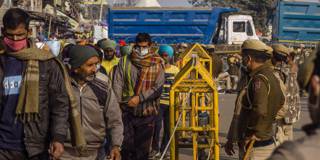Indian Prime Minister Narendra Modi's government apparently thinks that the huge open-air farmers’ protests outside Delhi may fizzle out in due course. But the farmers’ resolve, and their widespread public support, suggest that this time could be different.
NEW DELHI – India’s capital is under siege from more than two million farmers, who are currently gathered at the city’s border in a massive protest that started two weeks ago. Old and young men, women, and even children from farming families are camping on open roads in the bitter cold of a Delhi winter. They have abandoned their concerns about viral infection and come prepared for the long haul, bringing enough food to last for several months.

NEW DELHI – India’s capital is under siege from more than two million farmers, who are currently gathered at the city’s border in a massive protest that started two weeks ago. Old and young men, women, and even children from farming families are camping on open roads in the bitter cold of a Delhi winter. They have abandoned their concerns about viral infection and come prepared for the long haul, bringing enough food to last for several months.